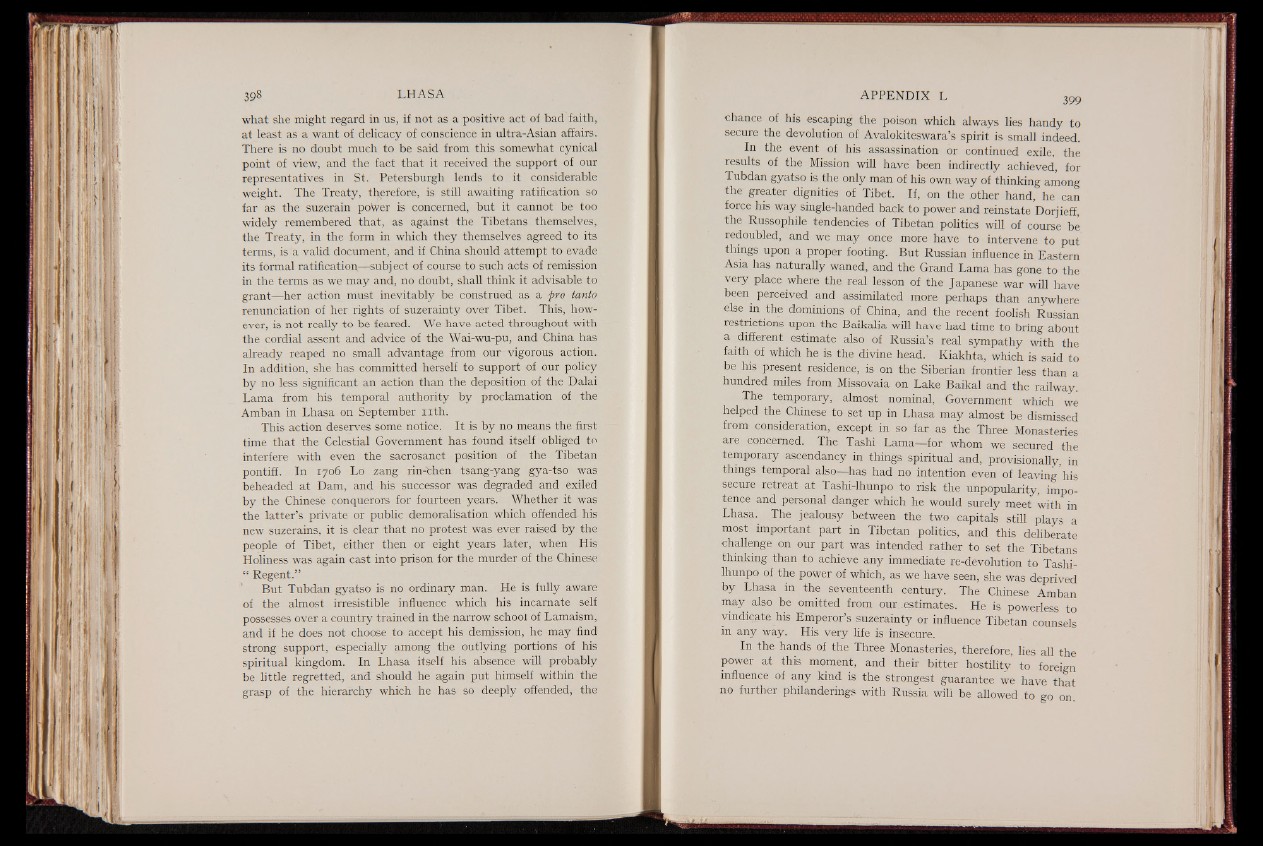
what she might regard in us, if not as a positive act of bad faith,
at least as a want of delicacy of conscience in ultra-Asian affairs.
There is no doubt much to be said from this somewhat cynical
point of view, and the fact that it received the support of our
representatives in St. Petersburgh lends to it considerable
weight. The Treaty, therefore, is still awaiting ratification so
far as the suzerain power is concerned, but it cannot be too
widely remembered that, as against the Tibetans themselves,
the Treaty, in the form in which they themselves agreed to its
terms, is a valid document, and if China should attempt to evade
its formal ratification—subject of course to such acts of remission
in the terms as we may and, no doubt, shall think it advisable to
grant— her action must inevitably be construed as a pro tanto
renunciation of her rights of suzerainty over Tibet. This, however,
is not really to be feared. We have acted throughout with
the cordial assent and advice of the Wai-wu-pu, and China has
already reaped no small advantage from our vigorous action.
In addition, she has committed herself to support of our policy
by no less significant an action than the deposition of the Dalai
Lama from his temporal authority by proclamation of the
Amban in Lhasa on September n th .
This action deserves some noticed It is by no means the first
time that the Celestial Government has found itself obliged to
interfere with even the sacrosanct position of the Tibetan
pontiff. In 1706 Lo zang rin-then tsang-yang gya-tso was
beheaded at Dam, and his successor was degraded and exiled
by the Chinese conquerors for fourteen years. Whether it was
the latter’s private or public demoralisation which offended his
new suzerains, it is clear that no protest was ever raised by the
people of Tibet, either then or eight years later, when His
Holiness was again cast into prison for the murder of the Chinese
“ Regent.”
But Tubdan gyatso is no ordinary man. He is fully aware
of the almost irresistible influence which his incarnate self
possesses over a country trained in the narrow school of Lamaism,
and if he does not choose to accept his demjssion, he may find
strong support, especially among the outlying portions of his
spiritual kingdom. In Lhasa itself his absence will probably
be little regretted, and should he again put himself within the
grasp of the hierarchy which he has so deeply offended, the
chance of his escaping the poison which always lies handy to
secure the devolution of Avalokiteswara’s spirit is small indeed.
In the event of his assassination or continued exile, the
results of the Mission will have been indirectly achieved, for
Tubdan gyatso is the only man of his own way of thinking among
the greater dignities of Tibet. If, on the other hand, he can
force his way single-handed back to power and reinstate Dorjieff,
the Russophile tendencies of Tibetan politics will of course be
redoubled, and we may once more have to intervene to put
things upon a proper footing. But Russian influence in Eastern
Asia has naturally waned, and the Grand Lama has gone to the
very place where the real lesson of the Japanese war will have
been perceived and assimilated more perhaps than anywhere
else in the dominions of China, and the recent foolish Russian
restrictions upon the Baikalia will have had time to bring about
a different estimate also of Russia’s real sympathy with the
faith of which he is the divine head. Kiakhta, which is said to
be his present residence, is on the Siberian frontier less than a
hundred miles from Missovaia on Lake Baikal and the railway.
The temporary, almost nominal, Government which we
helped the Chinese to set up in Lhasa may almost be dismissed
from consideration, except in so far as the Three Monasteries
are concerned. The Tashi Lama— for whom we secured the
temporary ascendancy in things spiritual and, provisionally, in
things temporal also— has had no intention even of leaving'his
secure retreat at Tashi-lhunpo to risk the unpopularity, impotence
and personal danger which he would surely meet with in
Lhasa. The jealousy between the two capitals still plays a
most important part in Tibetan politics, and this deliberate
challenge on our part was intended rather to set the Tibetans
thinking than to achieve any immediate re-devolution to Tashi-
lhunpo of the power of which, as we have seen, she was deprived
by Lhasa in the seventeenth century. The Chinese Amban
may also be omitted from our .estimates. He is powerless to
vindicate, his Emperor’s suzerainty or influence Tibetan counsels
in any way. His very life is insecure.
In the hands of the Three Monasteries, therefore, lies all the
power at this moment, and their bitter hostility to foreign
influence of any kind is the strongest guarantee we have that
no further philanderings with Russia will be allowed to go on.